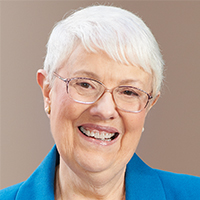Pacem In Terris: A Vision Realized
From its foundation in Germany in the mid-19th Century, the Congregation of the Sisters of Divine Providence, inspired by their co-founder, Bishop Wilhelm Emmanuel von Ketteler, has been committed to caring for the poor, the sick and the education of young girls.
When the community founded La Roche College in 1963, that mission extended first to young women religious, and within a few years to include local women and men, and a few international students.
In 1992 La Roche installed its sixth president, Monsignor William A. Kerr, who was drawn by the College’s mission: “To promote personal commitment to spiritual values and a hopeful vision of society—one where social justice, equal access to education, human dignity and community are esteemed.”
Within a year of his inauguration, moved by the media coverage of the savage war in Sarajevo, Monsignor Kerr felt compelled to act. His response was to found a project that would bring some of these young refugees caught in the chaos to complete their college education in Pittsburgh, Pa. Monsignor Kerr named the project after Pope John XXIII’s 1963 Vatican II encyclical, Pacem In Terris, Peace on Earth, which called for a worldwide commitment to the dignity of all individuals.
Supported by the Sisters, Monsignor’s outreach to 24 Christian and Muslim young people from Bosnia, Croatia, Kosovo and Macedonia began on Aug. 20, 1993 and grew over the next 25 years to include young people from four continents who were suffering some of the world’s most devastating conflicts.
Students from Rwanda, Burundi, Uganda, Qatar, Haiti, the Dominican Republic, Palestine, Jordan, Northern Ireland, Equatorial Guinea, Namibia, Ethiopia, Sierra Leone, The Democratic Republic of Congo, Saudi Arabia and Yemen arrived at La Roche and were welcomed by the Sisters and the University community. Most returned to their homeland with undergraduate degrees in hand, and some after completing graduate study.
Today these graduates give back to their countries and the world as teachers, physicians, research scientists, software designers, accountants, nurses, environmentalists, managers and government officials. They are employed in telecommunication, business, social work, finance and higher education. One serves as Ambassador of Equatorial Guinea; another founded a nonprofit for homeless Rwandan children. A group of Pacem graduates began the Mutete HIV/AIDS Foundation, which provides education and compassionate care primarily to women in Kampala, Uganda, and Kigali, Rwanda.
Under the leadership of Sister Candace Introcaso, CDP, Ph.D., La Roche’s president since 2004, the University has remained steadfast in its commitment to welcoming students from all over the world. In fact nearly 20 percent of the University’s total enrollment today are international students. Furthermore, through challenging times and financial pressures, La Roche has preserved the Pacem in Terris Scholarship program, rebuilding the resources necessary to support it through donations from friends and alumni. As alumni from the Pacem program have advanced in their professional careers, many have begun giving back generously to support the next generation of Pacem Scholars. As La Roche builds the Pacem endowment and scholarship funds, thanks to the further generosity of our donors, the University can welcome more students into the program.
The lives of more than 400 young people—and counting— have been changed by the Pacem In Terris program which, in turn, changed La Roche and, quite literally, the world. La Roche is proud and grateful for this enduring global legacy, which, with God’s blessing, will continue to flourish.

Sister Rita M. Yeasted, SFCC, Ph.D.
The Dorothy Saladiak Distinguished Professor of English
La Roche University